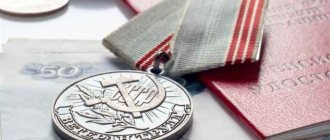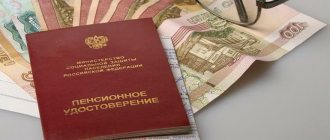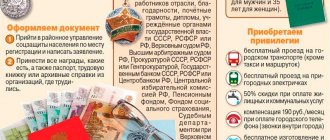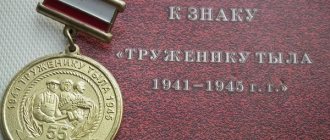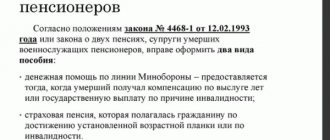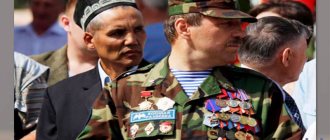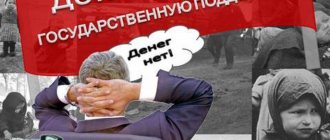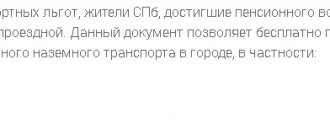Regulatory framework and latest changes for 2020
The main legislative act approving the procedure for assigning benefits and various types of social assistance is Law No. 5-FZ “On Veterans”. The circle of persons recognized as participants in the Great Patriotic War is determined by Art. 2 laws.
Art. is dedicated to family members of a deceased war participant. 21 laws. According to it, preferential benefits are provided to disabled family members who were dependent on a deceased WWII participant, as well as to the parents and spouse of the deceased. Disability and the presence or absence of dependency status in the latter case have no legal significance. Benefits are provided to spouses of war veterans, but on the condition that the widow does not remarry.
Also, certain provisions regarding preferential provision for widows of veterans are contained in other regulatory legal acts:
- “Rules for extraordinary provision of medical services. assistance”, adopted by Decree of the Government of the Russian Federation No. 123;
- Federal Law No. 166-FZ “On State Pension Provision”;
- Decree of the President of the Russian Federation No. 714 “On providing housing for veterans”;
- in administrative regulations for the provision of social security services;
- in other legal acts of federal government bodies, constituent entities of the Russian Federation and municipalities.
Recipients of benefits are provided with a uniform certificate, the form and procedure for the provision of which is established by Decree of the Government of the Russian Federation of June 20, 2013 No. 519.
2020 marks the 75th anniversary of the victory in the war. In honor of the holiday, the President of Russia signed decree No. 100 on 02/07/2020, providing for a one-time payment to war veterans, as well as their widows (widowers). Widows of veterans listed in subparagraphs 1–3 of paragraph 1 of Art. 2 laws “On Veterans” will receive 75 thousand rubles each, widows of home front workers will be paid 50 thousand rubles each. According to the latest news, payments will be made before May 9.
Widows of war veterans were underpaid
— Are we talking about a large surcharge?
— From 16 to 32 percent of the estimated pension amount.
— How did it turn out that widows of veterans of the Great Patriotic War did not receive them?
— The violation was discovered after an appeal from one of the widows, who complained that she was not given a timely recalculation of her pension after the death of her husband, a veteran of the Great Patriotic War, in 1984. By law, the widow of any combat veteran, when her husband is killed or dies, has the right to choose whether to receive a survivor's pension or a regular labor pension. In turn, a survivor's pension can be obtained both from the social security department and from the military registration and enlistment office. A military pension, which has special allowances, can be higher than usual, or lower. In Moscow, at the time of application, about two thousand widows of Great Patriotic War veterans who were not veterans themselves received a survivor's pension from the military registration and enlistment office (this bonus is already paid to veterans). We found out that widows were not given an increase in the estimated pension amount required by law: 32 percent for those whose husbands directly took part in hostilities, and 16 percent for those whose husbands also have the status of veterans of the Great Patriotic War, but did not take part in hostilities, they simply served during that period.
— Why weren’t they given this additional payment?
— The law regulating pensions for military and law enforcement officers is written in such a way that government agencies cannot pay them voluntarily. They proceed from the fact that this allowance is only of a personal nature, that is, it is due only to the veteran himself. The Ministry of Defense, for example, considers this law absolutely incorrect, but no other procedure is provided. And military registration and enlistment offices across the country found themselves hostage to the direct interpretation of this law. But the courts, on the contrary, take the position that this bonus is not of a personal nature and is due to widows, children, parents of a deceased or deceased veteran. Court decisions on such appeals are absolutely identical throughout the country - in favor of pension recipients. And if there is a court decision, the government agency is obliged to execute it.
— Military prosecutors cannot influence the situation without courts?
“We can submit a prosecutor’s presentation to the military registration and enlistment office, but they still won’t be able to do anything, since their budget schedule does not include such a basis for paying money as a prosecutor’s presentation. The budget does not allocate money for this. It turns out that it is impossible to restore the rights of recipients of military pensions by other measures of prosecutorial response, except for filing lawsuits in courts.
— Isn’t it possible to restore the rights of everyone at once with one lawsuit?
— Each pension recipient has special payment conditions - the size of the estimated pension, length of service, percentage of bonuses, and so on differ in each case. It is impossible to combine everyone into one process; you have to deal with each case separately. Now we are finishing our work with widows of the Great Patriotic War, after which we will immediately begin working with other categories. We could not do otherwise: even during the time that the widows’ claims won in the courts entered into legal force, exactly 100 of the 940 widows, unfortunately, had already died.
— Supplements are provided not only to widows of combat veterans, but also to other members of their family. Specify who exactly.
— Other family members are entitled to such bonuses only if they receive a survivor’s pension. We calculated that a total of 7.5 thousand people in Moscow need to increase their pensions. These are widows and family members of combat veterans in Afghanistan, Chechnya, South Ossetia and other military conflicts.
— Should the widows themselves be retired?
— According to the law, a person who has not reached retirement age can receive a survivor's pension. That is, a 40-year-old widow can receive a pension for her deceased husband and still work. Subsequently, if her working pension turns out to be higher, she will be able to refuse the military pension and receive a labor pension. But even now, not everyone who is entitled to a military pension wants to receive it. If the breadwinner, after participating in hostilities, retired from military service and went to work in a civilian structure, where he was paid a high salary, his relatives most often choose a survivor's pension, which is paid to them by social security, and not by the military registration and enlistment office. Such widows do not need their husbands’ military pension, and they are not entitled to bonuses.
— Let’s clarify: are bonuses given only to those whose relatives died in the war?
- Not only. The status of the combat veteran itself is important, but the place and circumstances of his death do not matter.
— Those who have just now learned about the required allowances can go to court on their own, without waiting until it’s their turn at the military prosecutor’s office? You don't have a million hands!
- Yes, we really have work in this regard - an unplowed field. But we will help everyone who turns to us.
— Over what period can you return what was not paid?
— The law provides for payment for 12 months from the date of filing the claim.
- But if people have not received bonuses for years, or even decades, is someone to blame for this? Were government agencies obligated to inform them?
— Government agencies do not have such obligations. It is also impossible to say that someone was negligent here: people did not go to the courts and the prosecutor’s office, their rights were not exercised.
Benefits for widows of deceased WWII participants
The list of benefits provided to widows of war participants and persons equivalent to them is specified in Art. 21 of the Law “On Veterans”.
Pension payments
Widows of veterans are usually not allowed to receive two pensions at once, so they have the right to independently choose the appropriate type of pension provision:
- personal insurance pension;
- survivor's pension (150 - 200% of the social pension).
The only exception to this rule are widows of military personnel who died during the war. This group of women receives both pensions. The survivor's benefit is assigned regardless of the widow's ability to work and whether or not she had dependent status during the life of the WWII participant.
In honor of memorable dates, spouses of veterans are paid a one-time cash benefit. Widows are also entitled to an additional monthly payment of 500 rubles. The legislation of the constituent entities of the Russian Federation provides for regional one-time and monthly payments to this category of citizens.
Medical service
The wife of a deceased veteran retains the right to service in departmental medical services. organizations where she was previously registered. Also, widows have the right to extraordinary medical and preventive treatment in departmental hospitals, hospitals and other medical and preventive institutions.
Housing subsidies
Final Recommendations
This list of benefits for widows of WWII participants, established by the Federal Law “On Veterans,” is open. Consequently, on the basis of by-laws at the regional or federal level, these categories of citizens may be provided with additional benefits provided by local budgets.
In order to clarify all the information on the provision of social assistance in a certain region through funding from the local budget, you must contact the Social Protection Department located at your place of permanent residence or registration.
Does the amount of assistance depend on the region?
Regional and municipal legislative acts have the right to establish additional preferences and types of social support for the wives of war veterans. For example, in the Moscow region, widows are provided with free hearing aid services, provision of mobile communications and a mobile phone with a monthly payment of expenses, and free travel on public transport.
Also, widows living in the Moscow region receive a cash payment of 5,000 rubles annually in honor of the anniversary of the Victory. Approximately the same level of social assistance is established in Moscow, St. Petersburg, etc.
Each entity determines the possible amount of social assistance to widows of veterans, based on the financial capabilities of regional and local budgets. Therefore, the full list of regional benefits varies depending on the wealth of the recipient’s region of residence.
What pension is due to the widow of a military pensioner?
In this paragraph, we will consider only options that provide for the retirement age of the widow of a serviceman. Upon reaching retirement age, the widow of a serviceman can apply for pension payments in accordance with her own length of service or switch to her spouse’s pension. In both cases, she can take advantage of the benefits provided by law.
How is it calculated?
After the death of her husband, the widow is assigned the right to live in the official living space, unless she is provided with other comfortable housing in return. She is also entitled to receive the following additional benefits:
Paragraph 2 of Article 21 states that widows, regardless of their state of health and degree of ability to work, the availability of wages and pension payments, have legal grounds for obtaining the preferential conditions described in paragraph 1.
- utilities: with the possibility of receiving a 50% discount on payments for electricity, heat, sewerage, waste disposal, but within the limits of the standards;
- housing with the possibility of improving the housing that the widow received from her husband;
- medical with the opportunity to visit health resorts and sanatoriums using vouchers issued by the organization in which the veteran previously worked;
- transport with the right to free travel on suburban railway transport;
- pensioners with the right to receive an increase to the basic pension;
- social with the right of priority check-in into nursing homes and various boarding houses, and receiving assistance from social services.
Benefits for widows of WWII participants provided by the state
This category is considered preferential, since women who were the spouses of front-line soldiers who defended the Motherland during hostilities throughout 1941-1945 also worked for the benefit of the country and tried to provide their family with everything they needed in difficult times. In the post-war period, many of the fighters did not have the opportunity to find a job due to illnesses and injuries, which prompted their wives to take the burden of responsibility for supporting their relatives and friends on their shoulders.
This is interesting: Tariff for major repairs in the Moscow region 2020
The government agency to which the application must be submitted depends on this. In addition to pension payments, Russian legislation still provides some benefits to widows: Thus, the state provides financial support to women who remain financially unprotected after the death of military personnel
- armed forces of the Russian Federation;
- internal affairs bodies and the penitentiary system;
- "Rosguard";
- state fire service;
- authorities for control over the circulation of drugs and psychotropic substances;
- military formations of the former Union.
The procedure for obtaining a pension for the widow of a military pensioner and its amount in 2020
- 50% on the amount of the spouse’s allowance if he went into the reserves or died due to a military injury;
- 40% - if death occurred due to an illness acquired during service.
Social pensions are subject to indexation - annually from April 1, taking into account the growth rate of the living wage of a pensioner in the Russian Federation over the past year. The indexation coefficient of social pensions is determined by the Government of the Russian Federation.
Important clarifications
All of these types of benefits are provided to the spouses of deceased war veterans, and not to all WWII veterans. According to paragraphs. 1 clause 1 art. 2 laws “On Veterans” recognize the following as war participants:
- military personnel of the army and navy;
- military personnel of the Ministry of Internal Affairs, state security, intelligence and counterintelligence who participated in hostilities;
- members of partisan detachments and organizations;
- workers and employees of enterprises that supported the activities of the army and navy, equal in status to military personnel.
Wives of other categories of persons who during their lifetime had the status of WWII veterans (home front workers, residents of besieged Leningrad, persons who worked on the construction of defense facilities, etc.) do not receive the right to preferential benefits after the death of their spouse.
Also, these types of social assistance are provided to widows only if they have not remarried.
Where should widows go in 2020 to receive financial assistance from the state?
Documentation is completed in the regional department of the social protection authority. The widow of a serviceman must provide the following documents to the institution:
- an application according to the sample addressed to the head of the USZN, submitted to the government agency;
- a registry office certificate of the death of a spouse or notification in an accessible way from remote areas;
- photo of the widow like a passport;
- ID card of a WWII participant; if you do not have one, you should submit a request to the military registration and enlistment office.
- Bank details for transferring funds from the state.
After confirmation of the status of a widow of a participant in hostilities has been received, you must contact the local branch of the Russian Pension Fund at your place of residence. You can obtain detailed information from the employees of the institution about the payments due from the state at the time of filing the application in connection with the assignment of social status. For example, it is possible to obtain a certificate for improving living conditions. To do this, you need to submit the following documentation to the Pension Fund of the Russian Federation:
- certificate of a widow of a WWII participant;
- passport of a Russian citizen;
- an extract from the house register about the citizens living in the premises;
- technical passport of BTI or Rostekhinventarizatsiya for apartments or residential buildings;
- receipts confirming payment for housing and communal services.
Compensation on a state basis for widows of employees of the Ministry of Internal Affairs of the Russian Federation
Widows of men who died in the position of an employee of the Ministry of Internal Affairs receive bonuses and benefits, social payments along with military personnel. Once a year, women can travel to the place of their husband’s death and back at the expense of the state.
For each child under 18 years of age, widows receive benefits and compensation for the cost of recreational holidays for the children of deceased spouses. When moving, the cost of 20 tons of luggage and train tickets or other types of ground transport are reimbursed from the budget.
